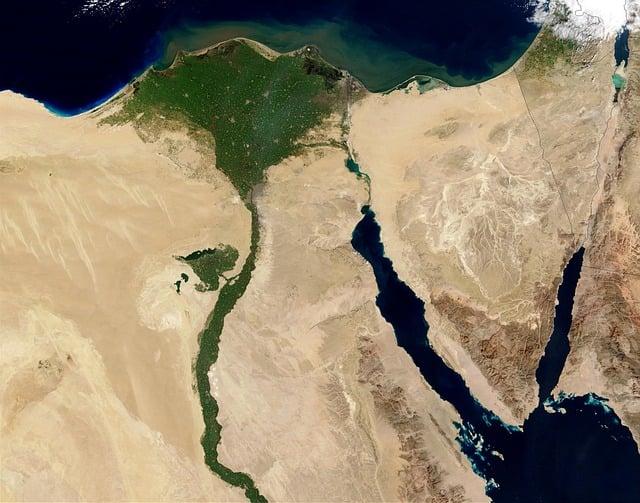In a significant escalation of military activity in the Horn of Africa, Egypt has recently deployed troops adn advanced weaponry to Somalia, a move that is already raising concerns among regional analysts and international observers. As the political landscape in the region becomes increasingly complex, this deployment reflects Cairo’s strategic interests in ensuring stability amidst ongoing threats from extremist groups and rival nations. The Foundation for defense of Democracies reports that this military intervention could have far-reaching implications for Somalia’s fragile security dynamics and could intensify existing tensions among neighboring countries.With ancient grievances and geopolitical rivalries at play, the situation warrants close scrutiny as Egypt navigates its role within a region beset by conflict and instability.
Egypt’s Strategic Military Move in Somalia and Its Implications for Regional Stability
Egypt’s recent decision to deploy troops and military assets in Somalia has ignited a complex set of dynamics within the Horn of Africa. the strategic implications of this move are manifold,as Egyptian forces are expected to assist in stabilizing the Somali government,which has struggled against insurgent groups like al-Shabaab. However, this has raised alarms among various stakeholders in the region. Concerns have mounted regarding potential escalation in military conflicts, particularly with neighboring nations who may view Egypt’s actions as a challenge to their own interests. key points of concern include:
- Shift in Military Balance: Egypt’s military presence could alter the balance of power in a region already marred by conflict.
- Reaction from Regional Powers: Countries such as Ethiopia and Kenya may respond with increased military readiness or diplomatic maneuvers.
- Effect on Interventions: This action may complicate existing international peacekeeping and humanitarian efforts in Somalia.
Furthermore,the long-term consequences of Egypt’s deployment are likely to reverberate across the region. This action challenges not only the sovereignty of Somalia but also raises questions about the role of external powers in African conflicts.Historically, the Horn of Africa has been a melting pot of competing interests, where issues of territorial integrity, resource allocation, and political representation converge. Some of the implications include:
| Implication | Description |
|---|---|
| Increased Tensions | Potential for conflict among regional states exacerbated by Egypt’s troop presence. |
| Refugee crisis | Military conflict could lead to a surge of displaced persons seeking asylum in neighboring countries. |
| Geopolitical Rivalry | Heightened competition between regional powers for influence over Somalia and the broader Horn of Africa. |

Understanding the Historical Context of Egypt’s Involvement in the Horn of Africa
The history of Egypt’s involvement in the Horn of Africa is steeped in complex geopolitical, cultural, and economic factors. For centuries, egypt has viewed the region as strategically vital, particularly due to its positioning along vital shipping routes and the shared resource of the nile River.this historical context includes:
- Colonial Legacy: The boundaries established during colonial times often disregarded ethnic and cultural divisions, leading to conflicts that persist today.
- Water Rights: Egypt’s reliance on the Nile for agriculture and survival has fueled its active participation in Horn of Africa politics,especially concerning upstream nations.
- Regional Alliances: Egypt has historically aligned with various factions in the region to counterbalance influences from countries like Ethiopia and Sudan.
In recent years,this involvement has taken a new form,with an increase in military presence in Somalia as part of a broader strategy to assert Egypt’s influence and secure its interests.This military engagement can be viewed as part of a larger pattern of Egypt seeking to:
- Counter Insurgency: Address the threats posed by terrorist groups that utilize the instability in Somalia.
- Expand geopolitical Clout: Increase leverage against regional rivals through military partnerships and support.
- Protect National Security: ensure that the waters of the Nile and regional commerce remain secure amid rising tensions.
| Key Events | Year |
|---|---|
| Egypt-Sudan Agreement on Nile usage | 1959 |
| First Civil War in Somalia | 1991 |
| Egypt’s military Intervention in Somalia | 2023 |

Potential Escalation of Conflicts: What Egypt’s deployment Means for Neighboring Nations
As Egypt mobilizes its military presence in Somalia, neighboring countries may find themselves at a crossroads, grappling with the implications of this heightened military engagement. Egypt’s deployment, marked by a significant transfer of troops and advanced weaponry, could be perceived as a strategic move to assert its influence in the Horn of Africa, a region already fraught with complex socio-political dynamics.Potential repercussions include:
- Heightened Security Concerns: Countries like Ethiopia and Kenya may feel pressured to bolster their own military capabilities to counterbalance Egypt’s growing presence.
- Increased Diplomatic Tensions: regional alliances might shift as nations reassess their relations with Egypt, possibly leading to a reconfiguration of existing geopolitical partnerships.
Additionally, local dynamics are likely to be affected, as militant groups and rival factions might exploit the changing military landscape to further their own agendas. This could result in:
- Renewed Conflict: The potential for clashes between rival ethnic groups or militant factions in Somalia could increase as Egypt’s military presence stirs unrest.
- Refugee Flows: Neighboring nations might brace themselves for an influx of refugees if violence escalates,placing additional strain on already strained resources.
| Country | Potential Impact |
|---|---|
| Ethiopia | Increased military readiness and potential internal instability. |
| Kenya | Strained relations with Egypt and possible shifts in alliance. |
| Somalia | Escalation of internal conflicts and humanitarian crises. |

Recommendations for International Response to Mitigate Tensions in the Horn of Africa
The recent deployment of Egyptian troops and weapons in Somalia has exacerbated existing tensions in the Horn of Africa,a region already fraught with complex political dynamics and historical rivalries. To mitigate these tensions, international actors must engage in a multifaceted approach that emphasizes dialogue, cooperation, and regional stability. Prioritizing diplomacy through direct negotiations among affected nations can help to address underlying grievances and foster mutual understanding. Considering the urgency of the situation, the following strategies should be considered:
- Promote Diplomatic Engagement: Encourage regional leaders to convene for peace talks, facilitated by neutral third parties, to address security concerns and collaborate on conflict resolution.
- Strengthen Regional organizations: Empower organizations such as the intergovernmental Authority on Progress (IGAD) to take a more active role in mediating disputes and overseeing peace initiatives.
- Enhance Humanitarian Support: Mobilize international aid to support communities affected by conflicts, ensuring the need for humanitarian assistance is met while minimizing the risk of exacerbating tensions.
- Monitor Military Activities: Establish an international monitoring mechanism to oversee military deployments and arms transfers in the region to prevent escalation.
Furthermore, involving a diverse coalition of international stakeholders can help provide the necessary resources and expertise to stabilize the situation. This coalition should include neighboring countries, multilateral organizations, and non-governmental entities to ensure a comprehensive approach. It is critical to clearly define the roles and responsibilities of each participant to facilitate effective collaboration. An significant step would be:
| Action Item | Responsible Party | Timeline |
|---|---|---|
| Facilitate Peace Talks | IGAD, UN | Within 3 months |
| Humanitarian Aid Coordination | NGOs, Red cross | Ongoing |
| Establish Monitoring Mechanism | UN, african Union | Start in 2 months |

the Role of Regional Powers: How Neighboring States Might React to Egypt’s Actions
The deployment of Egyptian troops and weaponry in Somalia raises significant concerns among neighboring states in the Horn of Africa, who may respond in various ways to Egypt’s military actions. Ethiopia,already contending with its own internal and external pressures,could view Egypt’s maneuvers as a direct threat to regional stability. With its historical animosities with Egypt over the Nile River water rights, Ethiopia might increase its military readiness or seek alliances with other states that could counterbalance Egyptian influence in the region. similarly, Kenya might reconsider its security posture, especially if it sees the potential for spillover effects from increased Egyptian military presence in Somalia affecting its own borders and major cities like Nairobi.
moreover, regional powers could adopt diplomatic strategies to mitigate the situation. South Sudan may capitalize on Egypt’s preoccupation with Somalia to advance its own interests in the region, perhaps negotiating closer ties with Ethiopia or even the United Arab Emirates, which has vested interests in the area. the reactions could also prompt Djibouti, a crucial maritime hub, to strengthen its military partnerships with foreign powers to ensure its own security from perceived threats.The interplay of military and diplomatic maneuvers in response to Egypt’s actions will considerably shape the geopolitical landscape, making the collective stance of neighboring states essential in managing the rising tensions.

Assessing the Impact on Humanitarian Efforts and Civil Society in Somalia
The deployment of Egyptian troops and weapons in Somalia signals a notable shift in the geopolitical landscape of the Horn of Africa,bringing with it potential consequences for humanitarian efforts and civil society within the region.As tensions rise, the fragile humanitarian framework already strained by ongoing conflicts and natural disasters may face additional challenges. Humanitarian organizations working diligently to alleviate suffering among vulnerable populations could experience complications in securing access, funding, and local partnerships. Furthermore, civilian communities might find themselves caught in the crossfire, exacerbating the existing crises of displacement, food insecurity, and limited healthcare.
In light of these developments, the international community must closely monitor the situation and take proactive measures to support humanitarian initiatives. Key considerations include:
- Advocacy for Humanitarian Access: Ensuring that aid organizations can operate without interference.
- Funding Mechanisms: Increasing financial support for NGOs responding to escalating needs.
- Protection of Civilians: Promoting policies that safeguard vulnerable populations from the adverse impacts of military actions.
Moreover, addressing the broader implications for civil society will be crucial. The potential dilution of local governance structures and the marginalization of community voices could hinder progress towards enduring peace and development. A collaborative approach that integrates humanitarian aid with the development of local capacities and governance will be essential to build resilience in a region that has historically faced enduring challenges.

In Summary
As Egypt bolsters its military presence in Somalia, the implications for regional stability in the Horn of Africa are profound and complex.The deployment underscores cairo’s strategic interests in securing its borders and countering perceived threats,while also provoking concern among neighboring nations and international observers. The situation remains fluid,and it is crucial to monitor the evolving dynamics as stakeholders respond to Egypt’s assertive actions. In an increasingly volatile region marked by historical grievances and competing interests, the potential for escalating tensions is significant. the international community must remain vigilant and engaged, as diplomatic solutions will be essential to fostering peace and stability in the Horn of Africa. As this story continues to unfold, the broader geopolitical ramifications of Egypt’s military maneuvers will warrant close attention from analysts and policymakers alike.







